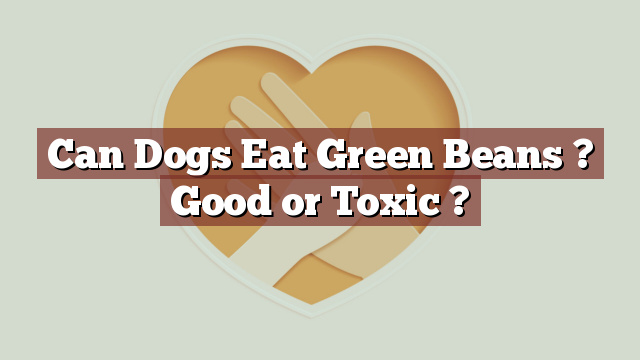Can Dogs Eat Green Beans? Good or Toxic?
Knowing what foods are safe for our pets to consume is crucial for their overall health and well-being. While certain human foods can be harmful or even toxic to dogs, there are others that can provide nutritional benefits. One such food that often raises questions among dog owners is green beans. In this article, we will explore whether green beans are safe for dogs to eat and the potential risks and benefits associated with feeding them to our furry friends.
Nutritional Value of Green Beans: Vitamins, Minerals, and Fiber
Green beans are a rich source of vitamins, minerals, and fiber, making them a nutritious addition to any diet. They are packed with essential nutrients such as vitamin C, vitamin K, manganese, and potassium. Moreover, they contain a significant amount of dietary fiber, which can aid in digestion and promote bowel regularity in dogs.
Are Green Beans Safe for Dogs to Eat? Exploring Toxicity Risks
Yes, green beans are generally safe for dogs to eat. They are not considered toxic to canines and can even provide numerous health benefits when incorporated into their diet. However, it is important to ensure that the green beans are prepared and served in a dog-friendly manner. This means avoiding any seasoning or additives that may be harmful to dogs, such as excessive salt, garlic, or onion powder.
Potential Risks and Benefits of Feeding Green Beans to Dogs
Feeding green beans to dogs can have several potential risks and benefits. On the negative side, if green beans are cooked with seasonings that are toxic to dogs, it can lead to digestive upset or even more serious health issues. Additionally, some dogs may experience flatulence or an upset stomach if they consume a large quantity of green beans too quickly.
However, when served in moderation and without any harmful additives, green beans can provide several benefits to dogs. The high fiber content in green beans can promote satiety and help with weight management in overweight dogs. Furthermore, the vitamins and minerals present in green beans contribute to a healthy immune system, strong bones, and overall vitality in dogs.
What to Do If Your Dog Eats Green Beans: Monitoring and Guidelines
If your dog accidentally eats green beans that were cooked with harmful seasonings, it is important to monitor their behavior and health closely. Watch out for any signs of digestive upset, such as vomiting, diarrhea, or excessive gas. In such cases, it is advisable to contact your veterinarian for guidance and possible treatment.
To ensure the safe consumption of green beans by your dog, it is best to serve them plain and unseasoned. Steaming or boiling green beans until they are soft and easily digestible is recommended. It is also important to cut the green beans into bite-sized pieces to prevent choking hazards, especially for smaller dogs.
Conclusion: Green Beans Can Be a Safe and Nutritious Addition to a Dog’s Diet
In conclusion, dogs can eat green beans as long as they are prepared and served in a dog-friendly manner. Green beans offer a multitude of nutritional benefits, including vitamins, minerals, and fiber. However, it is crucial to avoid adding any harmful seasonings or spices when cooking green beans for your furry companion. If you have any concerns or questions about your dog’s diet, it is always best to consult with your veterinarian for personalized advice and recommendations. By providing a balanced and appropriate diet, including safe foods like green beans, you can contribute to your dog’s overall health and happiness.
Thank you for investing your time in exploring [page_title] on Can-Eat.org. Our goal is to provide readers like you with thorough and reliable information about various dietary topics. Each article, including [page_title], stems from diligent research and a passion for understanding the nuances of our food choices. We believe that knowledge is a vital step towards making informed and healthy decisions. However, while "[page_title]" sheds light on its specific topic, it's crucial to remember that everyone's body reacts differently to foods and dietary changes. What might be beneficial for one person could have different effects on another. Before you consider integrating suggestions or insights from "[page_title]" into your diet, it's always wise to consult with a nutritionist or healthcare professional. Their specialized knowledge ensures that you're making choices best suited to your individual health needs. As you navigate [page_title], be mindful of potential allergies, intolerances, or unique dietary requirements you may have. No singular article can capture the vast diversity of human health, and individualized guidance is invaluable. The content provided in [page_title] serves as a general guide. It is not, by any means, a substitute for personalized medical or nutritional advice. Your health should always be the top priority, and professional guidance is the best path forward. In your journey towards a balanced and nutritious lifestyle, we hope that [page_title] serves as a helpful stepping stone. Remember, informed decisions lead to healthier outcomes. Thank you for trusting Can-Eat.org. Continue exploring, learning, and prioritizing your health. Cheers to a well-informed and healthier future!

